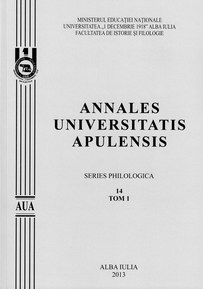Didactica modernă şi paradigma adaptării şcolii la cerinţele elevului
The Modern Didactics and the Paradigm of School Centred on the Student Need
Author(s): Liliana TAUSANSubject(s): Cultural Essay, Political Essay, Societal Essay
Published by: Universitatea »1 Decembrie 1918« Alba Iulia
Keywords: modern didactics; contemporary educational paradigms; school centred on the needs of the student; student-centered paradigm; present educational systems.
Summary/Abstract: Education adequate to modern democratic societies must be based on the idea that school is not only a tool for transmitting knowledge, but also a social institution in which students build up their knowledge and social skills that will allow them to integrate and successfully adapt to changes in society. It is a place of social learning and personal development that take place in close contact with family, local community and society as a whole. To satisfy the requirements which must be subordinated to education in the 21st century, widespread transmission of a growing volume of knowledge and information, on the one hand, and on the other educated individuals making available the tools needed to guide the future, the International Commission for Education in the 21st century, aims at to organizing education around four basic types of learning: learning to know, learning to do, learning to live together, learning to be. We notice an evolution of didactics as concept inside the context related to the tendencies and the evolution of education and schooling in the third millennium. The concept of didactics extends its meanings. It does not relate anymore only to schools and teaching-learning process. Didactics becomes an important field of educational sciences; it studies the analysis, the planning, the development and the evaluation of the teaching-learning process as an important process in schools, institutions, but also in self-education. The requirements for the readjustment of the school to the learning possibilities of the students and the vital need of a basic education as priority around the world manifest in accordance with the new principles of contemporary education and pedagogy, also with the European educational strategies as base for the existing educational system. The requirement to put the student in the center of the educational process, to adapt the latter to the capabilities and interests of all its activities represents a specific approach to the education constructivist paradigm, which, by comparison with the traditional paradigm presents a number of significant changes in design, strategy and action. The adaptation of the paradigm to school training requirements and opportunities of student education, and the network model for the organization of education systems, requires a diversification of learning situations and experiences, their construction according to the possibilities and needs of all categories of students to meet the principles of "inclusive school," school for All","integrated education". The idea of the education centred on the student – as person with individual characteristics that need to be valued and capitalized in education – is highlighted by the postmodern educational paradigm and by the constructivist approach of knowledge and education.
Journal: Annales Universitatis Apulensis. Series Philologica
- Issue Year: 14/2013
- Issue No: 1
- Page Range: 527-532
- Page Count: 6
- Language: Romanian

